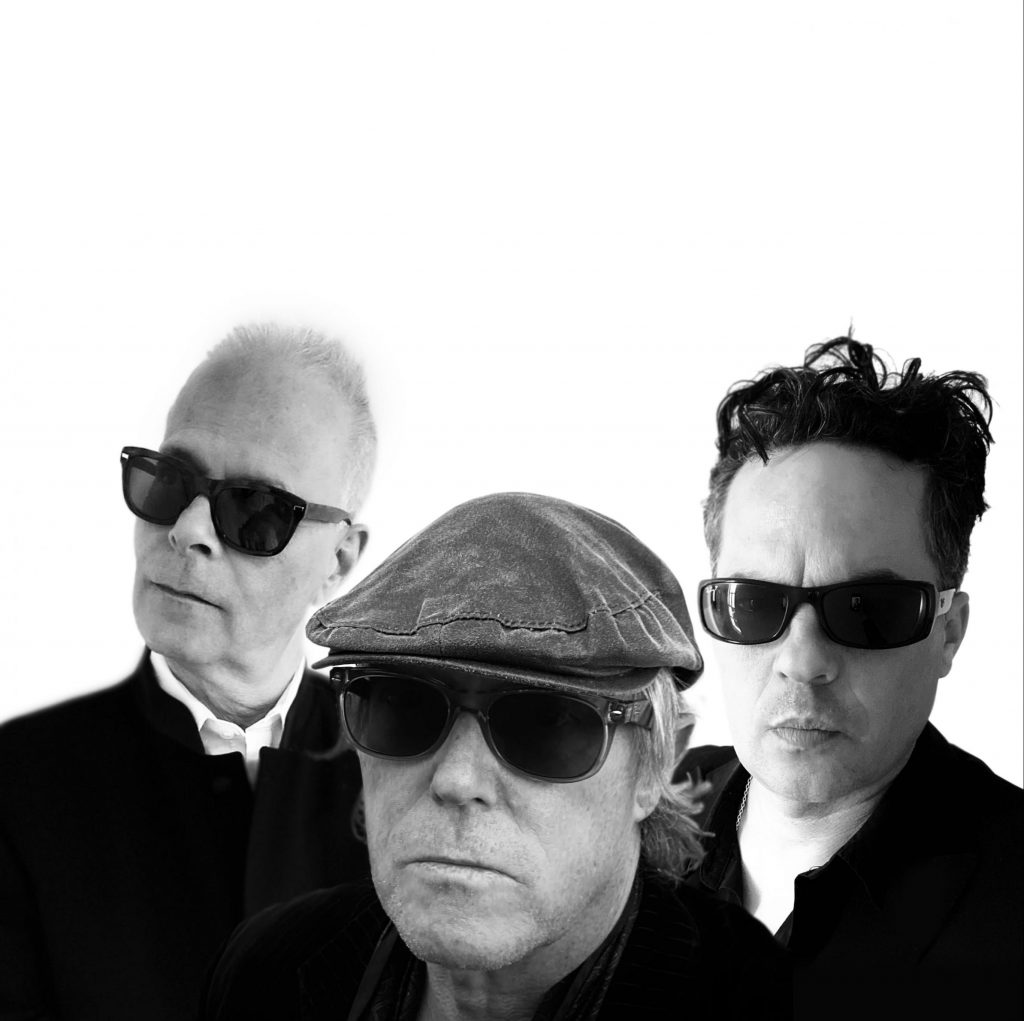By Keith Walsh
Night Crickets are a three-piece supergroup located in the U.S. and Europe, featuring David J. of Bauhaus and Love and Rockets, Victor DeLorenzo of Violent Femmes and Nineteen Thirteen, and solo artist Darwin Meiners.
The band title comes from an obscure quote by David Lynch, who scolded a sound guy on his film Mulholland Drive about bringing him audio of daytime chirping crickets. To paraphrase, Lynch said something like “Crickets sound different at night. Don’t give me these, give me the night crickets.” The anecdote was told to David J. by Lynch sound designer John Neff.
The band is as fascinating as the origins of its name, and then some. Falling in an odd sonic space between alternative jams and retro rock, their debut album “A Free Society” addresses current events through a nostalgic lens. The song “Candlestick Park” with Darwin on vocals, bring us back to somehow better times (despite police beatings, though preferable to shootings) while the title track addresses COVID-19 and other present day horrors while reminding us that we are, in fact, free.
Relatable Themes
“Little Did I” is somehow reminiscent of War’s “Low Rider,” but instead of celebrating Chicano culture, addresses the inadequacy of trying to see beyond our preconceptions and conditioning. It’s kind of pop culture condensation of Immanuel Kant’s Critique of Pure Reason.
David J. sings vocals on most of the songs, with exceptions. “Candlestick Park” and “Sloe Song,” feature Darwin, who also sings background vocals and the middle section of “Soul Wave” and the end of “Sacred Monster.” DeLorenzo steps out from behind the drum set to sing lead on “Little Did I” and “Amanda’s Mantra,” and at the end of “Soul Wave.” David J. brings all of his literary might to the tracks. It’s not just the sometimes spoken word approach that evokes the apparent freedom of the fifties and sixties. The album plays with jazz and pop, and freeform music, though the narratives are complex. In an age of media narrators who can’t be trusted, the album is as complex and important as “The Unreliable Narrator” that one of the album’s songs disdains.
Mostly, the themes are things most of us can relate to, unless it’s “Return To The Garden of Allah,” which riffs on the annoyances of fame. “Sacred Monster” documents the spectacle of the darker side of fame, with spoken chants of “sulfate, stardust, rehab, trainwreck,” on a slow rock groove. Again, nostalgia is evoked with the ethereal chant “Sinatra’s got nothing on you.” The music is as skillful as one could desire, featuring the three multi-instrumentalists in the band, with DeLorenzo providing drums and percussion throughout. There’s occasional synth work, all of it as tasty as you might expect from these musical masters.
The lists of guest artists is long as well: Janet Schiff (cello, keyboards, background vox), Malachi DeLorenzo (drums, bass, guitar, keyboards, percussion), Jesse Catalino Montigo (alto sax), Julian Shah-Tayler (mellotron), Marc Warren (spoken word on “Unreliable Narrator”), Derek Doss (guitar), Matt Meixner (keyboards).
The album was recorded by the sharing of files between San Jose, Los Angeles, Milwaukee, and London, and expertly mixed by Meiners. Somehow coming together in the age of COVID while the creators led already busy lives, A Free Society is an enigmatic, occult treasure waiting to be unpacked.
Night Crickets On Apple Music
Night Crickets On Spotify
Omnivore Recordings
finis


One thought on “The Enigmatic Treasure Of Night Crickets’ “A Free Society””